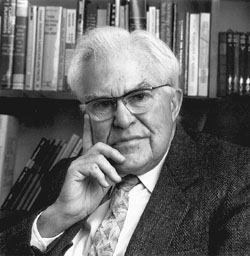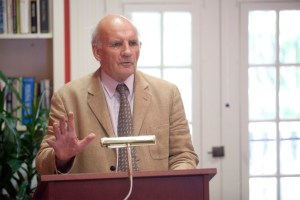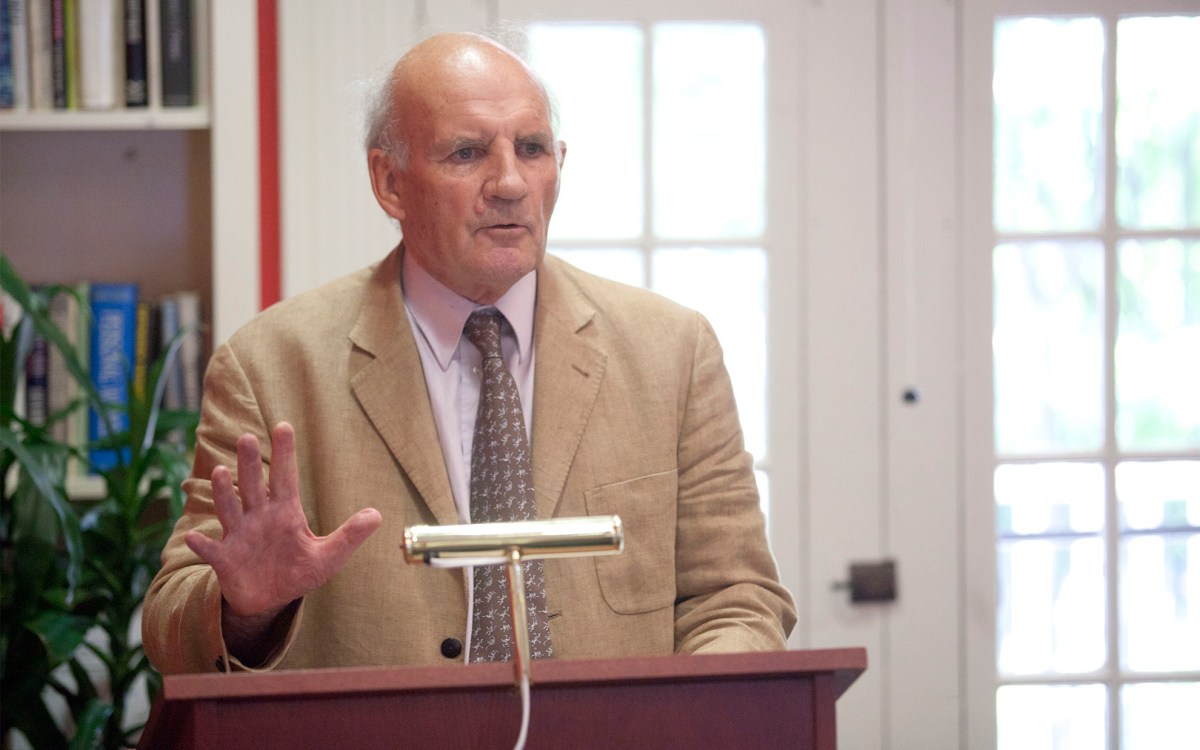Wilfred Cantwell Smith
In Memoriam
At a meeting of the Faculty of Arts and Sciences on November 13, 2001, the following Minute was placed upon the records.

With the passing of Wilfred Cantwell Smith on February 7th, 2000, the comparative history of religion lost one of its most influential figures of the past century. As a Canadian colleague put it, “He and Mircea Eliade taught the post-World War II generations to think comparatively.”
Wilfred was born on 21 July 1916 in Toronto. He took his B.A. degree with honours in Oriental Languages in 1938 from the University of Toronto, where he was a Social Gospel activist and President of the Canadian Student Christian Movement. At university he met Muriel MacKenzie Struthers. They were married in 1939, when Muriel finished her degree, and she joined him in England for his second year studying Theology at Westminster College, Cambridge, and Oriental Languages at St. John’s College, Cambridge University.
From 1940-45, the Smiths were in India with the Canadian Overseas Mission Council. Wilfred taught Islamic and Indian History at Forman Christian College in Lahore, while Muriel completed her medical degree. Both became involved in Hindu-Muslim discussions and worked against the looming Partition. Wilfred’s engagement with India was already evident in his thesis on Islam in India, which was rejected at Cambridge University, as his adviser H.A.R. Gibb of Oxford (and later Harvard) predicted, because of its sharp Marxist critique of the British Raj. Published, however, in India in 1943, and often after, as “Modern Islam in India: A Social Analysis,” it is still in print.
After the war, the Smiths returned to Toronto, where they had the first of five children born between 1946 and 1954. Wilfred enrolled anew in doctoral study at Princeton, taking his M.A. in 1947 and Ph.D. in 1948. His thesis, on the al-Azhar Journal in Cairo, undergirded his seminal book of 1957, “Islam in Modern History.” After he returned alone for a year in Lahore, the Smiths moved to McGill in 1949 where he was appointed the first Birks Professor of Comparative Religion. In 1951 he became the founding director of McGill’s Institute of Islamic Studies, where he brought together Muslim and non-Muslim Islamic specialists in a bold new venture – the study of a common subject by scholars of different religious and cultural traditions. The McGill years were extremely significant for his scholarship: “Islam in Modern History” and “The Meaning and End of Religion” (1963) are his most influential works in the two fields on which he has left indelible marks: Islamic studies and comparative religion.
In 1964, Wilfred was appointed professor at Harvard Divinity School and successor to Robert Slater, founding director of the Center for the Study of World Religions. He and Muriel made the Center their joint venture, and it flourished; dinners with them were always an experiment in international exchange. Wilfred devoted much of his time also to comparative studies in the FAS Ph.D. program in religion. By the time he chose to leave Harvard in 1973, he had also helped lay the groundwork for the College’s honors concentration in the Comparative Study of Religion, established in 1974.
Back in Canada, as McCulloch Professor of Religion at Dalhousie University, Wilfred founded a new department and wrote two books, “Belief and History” (1977), and “Faith and Belief” (1979). Persuaded to return to Harvard in 1978 to an appointment in FAS and the Divinity School, he took up for the next six years the chairmanship of the Study of Religion, now overseeing A.B. as well as Ph.D. studies. Within two years, the Ph.D. program was revised to reflect Smith’s global vision, mandating comparative work for all doctorands.
Smith’s growing interest in rethinking Christian theological approaches to other religious traditions resulted in his 1981 book, “Towards a World Theology.” His later years were dedicated to scripture as a global phenomenon, and his last book, in 1993, was the culmination of this work. In January, 2000, during his last illness, he was made an Officer of the Order of Canada – the Canadian equivalent of knighthood in Britain.
Wilfred was one of the last puritans, but never imposed his moral rigor on others – a measure of his respect for every individual and of his insistence on taking people of all faiths and cultures equally seriously. He was a critic of “orientalism” years before Said, and of intellectual colonialism long before post-colonialist debates. No friend of the growing focus on theory in the humanities, he insisted one should study subjects, not “methods,” yet draw on every possible discipline to elucidate one’s subject. For him, scholarship demanded relentless eclecticism: as he put it, “interdisciplinary studies are a ladder to get out of a hole into which the true scholar never falls.”
Wilfred noticed and nurtured students and colleagues. He was always recommending someone here or there, asking questions about one’s recent article, inviting someone abroad to visit Harvard to enter into colloquy here. He was a gifted promoter of promise wherever he saw it, and he had a new project for anyone who wanted one. A searching critic of whatever he found wanting, he always listened thoughtfully to arguments opposed to his own. He lectured in a “flat” tone, his voice often falling off at the climax of a sentence, as if to avoid every rhetorical flourish. Yet the insights that survived his delivery sparkled. Wilfred’s last lecture was a case in point – delivered in a low voice with little modulation; yet, as one senior colleague says, “I kept having the experience of realizing that the sentence I had just heard was one of the most beautiful sentences I had ever heard in my life.” Wilfred’s closing words were testimony to the probing eloquence of his thinking: “I’m not saying that religion is a good thing. I’m saying that it’s a great thing. It can make you better or it can make you much worse. But it means that you take the question of how to live seriously.” He took almost everything seriously, most of all the necessity of ruthless honesty in thinking and utter integrity in living. Veritas was for him an ultimate commitment, whatever the consequences.
Respectfully submitted,
Hilary Putnam
Diana Eck
John Carman
Tu Wei-Ming
William Graham, Chair




